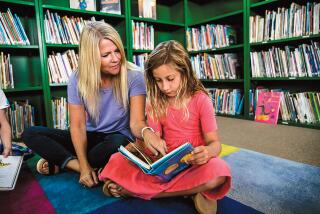Reading Can Fill Empty Hours
- Share via
With a couple of weeks of summer vacation out of the way, a lot of students are already tiring of “I Love Lucy” reruns and hanging out at the mall.
That means it’s a great time to start your child on a reading program that I guarantee will make him or her better-rounded and more knowledgeable when school reopens.
It also will help your child improve reading skills, develop new interests and spend quality time with you.
Here’s my free and easy plan.
Your child will read at least one book from each of eight general areas that are crucial for a well-rounded mind. After completing each book and answering some questions about it, he or she gets a reward and moves to the next one.
The eight categories are:
* Biography.
* Science, whether the topic is dinosaurs, nuclear energy or ecology.
* Foreign countries, ideally dealing with a nation often in the news.
* Adventure, including animal stories, war tales and science fiction.
* The arts.
* Health, such as Magic Johnson’s book on children and AIDS.
* Human relations, a term I adopted for books that help make children more tolerant of their peers. These feature characters who have different backgrounds from your child’s.
* Pure fun, which includes anything your child desires.
Ask a librarian or bookseller for suggestions. Then look the book over to make sure that it is the type you need and that it is at the right reading level for your child.
Set a firm time limit, usually a book a week. And, rather than letting the child choose which kind of book to read, I suggest that you make it random to sustain interests.
The biggest dilemma for most parents who put their children on reading programs is: “How do I know that my child has really read the book?”
No problem--just “interview” him or her for about 10 minutes by asking some revealing questions.
Skim the book privately beforehand, and don’t tell the child what kinds of questions you will ask.
Here are some sample questions to get you started:
For a biography, ask “How was the person trained or educated to reach his or her goal?” and “Name a couple of traits or achievements you’d like to imitate.”
Science books can be covered with “Tell me about the five most interesting or surprising things you learned” or “What was the hardest concept to understand?”
To check on reading about foreign lands, ask “What would you like to see if you could visit the country?” or “What customs do the citizens have that we don’t?”
Adventure stories usually fit questions such as “Describe the most dangerous or suspenseful part of the story” and “Give me an example of the character’s courage.”
Arts differ widely, but you should be able to use some form of questions such as “Explain the origin of graffiti art” or “Describe the training and skills needed to be an opera star.”
Ideally, health books should improve your child’s way of living, so ask questions such as “How will what you’ve read affect your life/diet/behavior?”
For human relations books, use prompts such as “How is the character’s background or life different from yours?” and “What are the advantages and disadvantages of the character’s situation?”
To check up on fun books, try “Describe your favorite scene” or “Would you recommend this book to friends? Why or why not?”
Remember to give a reward after each book is read.
Every child welcomes cash, but I think it’s better to avoid that custom in favor of an activity that allows you to spend time together.
I especially suggest some exercise--maybe a game of catch, an afternoon of boogie-boarding or a walk to the corner store for a healthy snack.
More to Read
Sign up for our Book Club newsletter
Get the latest news, events and more from the Los Angeles Times Book Club, and help us get L.A. reading and talking.
You may occasionally receive promotional content from the Los Angeles Times.










